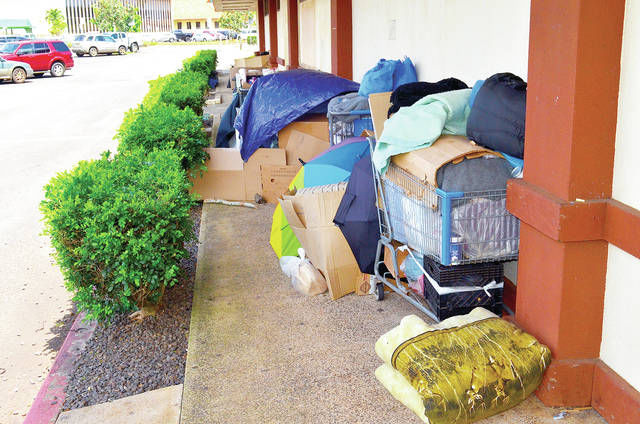LIHUE — Homelessness on Kauai dropped 7 percent in the 2017 Hawaii Statewide Homeless Point-In-Time count. On Kauai, the count reported 412 homeless persons compared to 442 last year. The figure accounts for 297 unsheltered homeless persons and 115 sheltered.
LIHUE — Homelessness on Kauai dropped 7 percent in the 2017 Hawaii Statewide Homeless Point-In-Time count.
On Kauai, the count reported 412 homeless persons compared to 442 last year. The figure accounts for 297 unsheltered homeless persons and 115 sheltered.
“As we’ve identified partners, we’ve provided grant funds to produce more affordable housing and homeless shelters,” said Gov. David Ige in a statement. “All of the city, state and federal partners working together have made a tremendous difference.”
For Kauai shelters, there was $515,623 provided in grants from the government and another $148,927 provided in Grant in Aid.
However, words and grants means little to those who are seeking shelter.
With his back up against the old Big Save grocery store, Kenny, who did not want to give his last name, listens to music. The homeless man, with all his belongings sitting next to his left leg, enjoys the shade with headphones in both ears. He said he is biding his time until he leaves Kauai, a place he has, ironically, called home for the past eight years after moving here from Fairbanks, Alaska.
“Not much going on here; I’m not looking for work,” he said. “I’ve worked my entire life; I’ve raised my five children and they’re all successful. I have lung cancer, and I plan on leaving rather soon. I’ve been working on it for over a year now.
“My goal is to leave. I have dreams, I have aspirations, and my intentions are to follow those,” he added.
Kenny may feel isolated on Kauai, with his family thousands of miles away, but he does not victimize himself, despite the daily obstacles he faces.
“I’ve had my stuff stolen numerous times, it gets frustrating,” he said. “But you can’t categorize everybody as the same because there’s some really nice guys here. Everyone has their own set of circumstances. From my point of view, there’s not a homeless problem: There’s a people problem.”
The annual Point in Time count — a census of people experiencing homelessness — showed a 9 percent decrease in the number of homeless individuals across the state. It was the first decline in eight years. The report did not offer reasons for the fall in homelessness.
This year’s count found 7,220 homeless individuals across Hawaii compared to 7,921 in 2016.
Hawaii County saw a 32 percent decline in homeless individuals and Maui County saw a 22 percent decrease compared to 2016. Oahu saw a half percent increase in homeless individuals.
“The report shows continuing momentum from last year when we slowed the rate of growth to 4 percent,” said Brandee Menino, chairperson of Bridging the Gap and CEO of Hope Services Hawai‘i, Inc. Bridging the Gap represents all neighbor islands.
Jen Stasch, director of Partners In Care, leads ‘Oahu’s Continuum of Care.
“This year’s count drew nearly 500 community volunteers,” Stasch said. “Partners in Care will continue engaging with all sectors of the community to move the needle.”
Clity Shepard lives on her father’s empty lot, Clity has seen the bad, the ugly and the indescribable.
“When you’re on the street, it’s hard. You need structure; you need a plan to be homeless,” she said. “You cannot just be homeless. The majority of them don’t have a plan and get really frustrated because they can’t find a cheap place to do. And what do they do? They go on drugs.”
The lot Clity lives on has no house, no plumbing, “no nothing,” as she put it. The decision to move to the empty lot was something she and her family made on their own.
“I was staying up in Wailua in an illegal rental. And we just decided as a family that we weren’t going to pay $1,800-$2,000 a month for rent, which is ridiculous,” she said.
Clity said she’s learned a thing or two about life on the streets. For starters, not everyone is houseless by their own accord.
“There’s probably 40 percent of people who are homeless because of rent and stuff like this. They choose to just not to pay that amount. And then there’s that other 60 percent that keep to themselves.” she said.
Clity and Kenny have seen how drugs have impacted the homeless. For Kenny, the usage of drugs is out of control.
“I see people, rather than trying to do something to help themselves, they’re constantly doing this drug called ‘clear,’ ” he said. “It’s like ice, I think. And that seems to be what the problem is.”
Michael Parisi, who has been homeless for the past three years, feels victimized because of the rapid drug use among other homeless people.
“I feel that the eradication of the homeless is perverted, mostly.” he said.
Kenny, who said he’s on disability and can’t afford a place by himself, has always understood the reality of living on Kauai, no matter how much money he made.
“It’s a matter of prioritizing where people put their money. You can’t help someone that’s not willing to help themselves. And I’ve been homeless for a long time and I knew within the first year of living in Hawaii that I couldn’t afford it,” he said. “Basically, I knew that as long as I live in Hawaii, I will be homeless.”
As for his five children, Kenny said that they have no idea of his living situation.
“Why burden them with that? They have their own wives and husbands and lives,” he said. “After all, life is what you make it.”
Kauai Economic Opportunity did not respond to requests for comment for this story.


